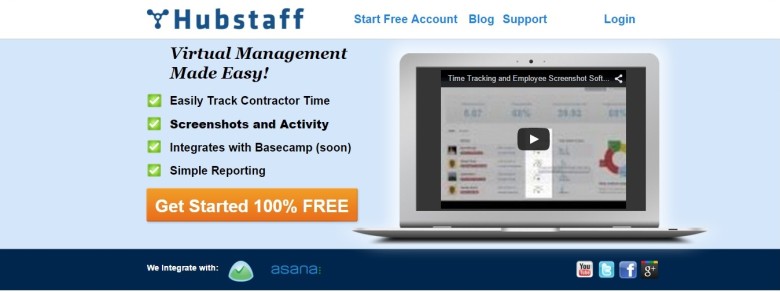If you’ve arrived at this post, you’re probably wondering how to ask for a raise. Now, you might be thinking, easier said than done, right? Wrong.
Asking for a raise isn’t scary when you’re well-prepared and know your worth. That’s why we’re here to help you simplify this process and give you the insights you need to showcase your productivity with Hubstaff.
Hubstaff is a workforce management tool that helps you track your work hours and productivity to gain data-driven insights that help you demonstrate your value to your employer.
Today, we’ll guide you through how to ask for a raise and build an evidence-based argument. Hubstaff’s features, like detailed reports on your work hours and productivity metrics, can help you take a data-driven approach to asking for a raise that can help you wow your managers.
Before we get started, we can’t stress enough that good things don’t come to those who wait when it comes to raises. Let’s discuss the importance of asking for a raise.
Boost your team’s efficiency with Hubstaff's productivity tools
The importance of asking for a raise
Regularly reviewing your compensation ensures that you’re being paid what you’re worth and signals to your employer that you’re serious about your professional development. Asking for a raise isn’t just about the money — it’s about pinpointing your contributions and ensuring your pay matches your progress.
According to LinkedIn, 80% of Americans feel they deserve a raise, but only 60% intend to ask for one, and 58% say they are afraid to do so.

You’re not alone if you’re nervous about asking for a future raise. It’s awkward to talk about being paid more money, but learning to advocate for yourself is essential.
How to ask for a raise: a step by step guide
In this step-by-step guide, we’ll walk you through evaluating your worth, researching industry benchmarks, and timing your request perfectly to help you confidently approach your raise discussion.
1. Assess your value
First things first, you need to think about your contributions. Ideally, you would keep track of your work throughout the year. If you haven’t done that, don’t panic. Take some time to step back and think about what you’ve accomplished.
Ask yourself:
- What have I accomplished in my role?
- Have I taken on new responsibilities?
- Have I gone above and beyond my job description?
- Have I gotten any shout-outs acknowledging my hard work?
Make a list of these critical achievements. Then, quantify your successes when possible. Remember, numbers are more powerful than words here.
Here are some examples:
- I streamlined the content production process by 25% by cutting unnecessary steps.
- I created a new customer retention strategy that increased client renewals by 20%, directly boosting our monthly recurring revenue (MRR).
- I developed an automated system that reduced the time spent on monthly reports by 30%.
These features give you the data you need to confidently justify why you deserve a pay raise based on measurable performance and results.
2. Research salary benchmarks
Doing some research can give you a solid idea of what’s fair and competitive in your industry.
Here are some resources you can check out:
- Glassdoor: Provides salary information based on job title, company, and location.
- PayScale: Offers detailed salary reports based on experience, education, and skills.
- Industry Reports: These are usually published by professional organizations or research firms and provide insights into salary trends within specific industries.
- Robert Half. Robert Half’s salary calculator takes experience and cost of living into account by allowing you to search for base salaries based on job title and location.
With this information, you’ll not only feel more confident in your ask, but you’ll also have the data to back it up.
3. Consider the context
No matter how deserving you are, a raise affects the company, too. Timing is everything, so you’ll need to consider your company’s overall financial situation and your department’s current budget.
If business is thriving and your department is hitting its goals, it could be a great time to make your request. However, if the company is talking about budget cuts, you might need to adjust your expectations or timing.
It can be hard to get the full picture of a company’s financial situation. Still, considering the overall health of your company can help you frame your request in a way that’s more likely to be received positively.
Pro tip: When was your last raise? When opening salary discussions, remember your last raise request. When formulating a salary request, consider tight budgets, cost savings, timing, and other key points.
4. Determine your ask
You’ve already done the initial work of finding the industry average for your position and considering your impact on the business. Now, pull that information together to determine how much you want to ask for.
Pro tip: Your best bet is to have a range in mind rather than a single number. A range gives you flexibility in the negotiation process. For example, you might say, “Based on my research and the value I’ve brought to the team, I’m looking for an increase of 8% to 10%.”
Check out our guide for calculating a raise.
We can’t tell you exactly how much you should ask for. But we can look at some standards to help you determine what is appropriate.
What is a reasonable raise to ask for?
An appropriate annual raise typically ranges between 3% to 5% of your current salary (depending on inflation.)

However, if you’ve taken on additional responsibilities, been acknowledged as a top achiever, or if market salary data suggests that your role is underpaid, asking for a 10% to 20% raise may be justifiable.
5. Come up with a script
Before you walk into that meeting to ask for a salary review, take a deep breath, put pen to paper (or fingers to keyboard), and get your script ready. Winging it isn’t the best approach for something this important.
Example script for asking for a raise
“Hi [Manager’s Name],
Thank you for taking the time to meet with me. I wanted to talk about my position and the value I’ve been bringing to the team. Over the past [time period], I’ve been able to [mention a few key accomplishments or contributions], and I’ve seen [metrics showing how these have positively impacted your projects.]
Given this progress and the extra responsibilities I’ve taken on, I feel that it’s the right time to discuss my compensation. Based on industry standards and my additional efforts, I’d like to explore the possibility of a [X%] raise.
What are your thoughts?”
Remember, preparation shows you’re serious, and that can make all the difference.
6. Prepare to handle objections
Now, for the part you’ve been afraid of: the possibility of rejection. When you ask for a pay increase, you may be met with hesitation or even a firm “no.”
You can’t control the outcome of this conversation, and often, budget constraints are out of your manager’s control. But, you can walk in prepared to negotiate and respond to a negative response.
Don’t get discouraged. Use this as an opportunity to open up a conversation. If your manager seems hesitant, ask for more information, like: “Can you help me understand what is in the budget for my raise this year?”
Pro tip: come prepared with an alternative. If a raise isn’t an option, be ready to negotiate other benefits. You could request more vacation days, flexible work hours, or a performance-based bonus.
Stay calm, keep the conversation open, and focus on finding a win-win solution.
Final tip: Use Hubstaff to ask for a raise
At Hubstaff, we’re all about making data-driven decisions and supporting employee empowerment. That’s why we work hard to ensure our software can provide the data you need to showcase how you’ve been progressing in your role.
Here are a few features that can help:
- Time tracking & timesheets. You can quickly access timesheet data to show your manager exactly how many hours you’ve worked and that you haven’t missed shifts or clocked in late.

- Productivity metrics. Using the Insights add-on, you can demonstrate your productivity metrics as proof of your efficiency and focus. It’s hard to argue with concrete numbers highlighting your average activity, time utilization, and meeting vs. focus time.
- Industry benchmarks. You can use productivity benchmarks to see how your productivity aligns with other users in your industry. If these numbers are favorable, this is a great data point for your raise discussion.

These features give you the data you need to confidently justify why you deserve a raise based on measurable performance and results.
Now, it’s time to get started and prepare to make your salary increase request. Swallow your fear, gather your data, and get your script ready. You’ve got this!
Most popular
The Critical Role of Employee Monitoring and Workplace Security
Why do we need employee monitoring and workplace security? Companies had to adapt fast when the world shifted to remote work...
15 Ways to Use AI in the Workforce
Whether through AI-powered project management, strategic planning, or simply automating simple admin work, we’ve seen a dramatic...
The AI Productivity Panel: Lessons From Leaders on What’s Working (and What’s Not)
When I moderated this AI productivity panel, I expected a solid conversation. What I didn’t expect was the flood of real-world i...
Employee Performance Dashboards: Templates, Tools, and Best Practices
Keeping track of how your team’s really doing can be tricky. Spreadsheets pile up, one-on-ones only tell part of the story, and...




